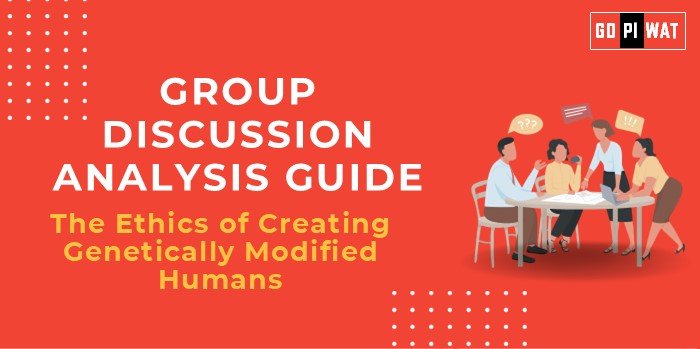📋 Group Discussion (GD) Analysis Guide: The Ethics of Creating Genetically Modified Humans
🌐 Introduction to The Ethics of Creating Genetically Modified Humans
Opening Context: “The ability to alter the genetic makeup of humans, once a topic of science fiction, is now a tangible reality due to advancements in genetic engineering technologies like CRISPR. This raises profound ethical, social, and philosophical questions.”
Topic Background: Genetic modification in humans involves altering DNA to eradicate diseases, enhance traits, or achieve specific physical or intellectual outcomes. This practice stirs debates on morality, societal impact, and the boundaries of science.
📊 Quick Facts and Key Statistics
- 🧬 CRISPR Milestone: First successful CRISPR-edited babies in 2018 sparked global ethical debates.
- 🦠 Rare Diseases: Over 10,000 rare diseases could potentially be addressed through genetic modification.
- 💰 Cost of Gene Editing: Estimated $5,000–$20,000 per treatment in 2024, limiting accessibility.
- 📊 Ethical Opinion: Surveys suggest 70% of global respondents oppose “designer babies” due to moral concerns.
👥 Stakeholders and Their Roles
- 🏛️ Governments: Regulate genetic modification to ensure ethical compliance and safety.
- 🔬 Scientists and Bioethicists: Develop technology while debating its ethical implications.
- 💊 Pharmaceutical Companies: Invest in research and commercial applications of gene therapy.
- 👥 Public and Advocacy Groups: Voice societal concerns and push for ethical accountability.
🏆 Achievements and Challenges
✨ Achievements:
- ✔️ Eradication of Genetic Diseases: Potential to eliminate inherited conditions like cystic fibrosis.
- 🩺 Medical Advancements: Enhanced understanding of genetic disorders and personalized treatments.
- 🔬 Scientific Milestones: CRISPR-Cas9’s role in precise DNA editing is a game-changer.
⚠️ Challenges:
- ⚖️ Ethical Dilemmas: Potential misuse for non-medical enhancements raises moral concerns.
- 💸 Economic Disparities: Limited access creates inequality in healthcare and opportunity.
- ❓ Unintended Consequences: Unknown long-term effects on human genetics and biodiversity.
🌐 Global Comparisons:
- 🇨🇳 China: High-profile CRISPR trials highlight regulatory gaps and ethical controversies.
- 🇩🇪 Germany: Strict bioethics laws prohibit human germline editing, ensuring a precautionary approach.
💬 Structured Arguments for Discussion
- ✔️ Supporting Stance: “Gene editing offers an unprecedented opportunity to eradicate debilitating genetic conditions and improve quality of life.”
- ❌ Opposing Stance: “Tampering with human genetics opens Pandora’s box, creating risks of societal inequality and unforeseen genetic consequences.”
- ⚖️ Balanced Perspective: “While gene editing is promising for eradicating diseases, robust ethical frameworks are essential to mitigate risks and misuse.”
🛠️ Effective Discussion Approaches
- 🎯 Opening Approaches:
- 📖 “Since the discovery of DNA, humanity has aspired to alter it—are we prepared for the consequences?”
- 📊 “Gene editing could address over 10,000 rare diseases, but 70% of people oppose its use for non-medical enhancements.”
- 🔄 Counter-Argument Handling:
- Ethics: “Even if ethical concerns exist, can we afford not to explore life-saving possibilities?”
- Accessibility: “Governments can subsidize gene-editing technologies to bridge accessibility gaps.”
🔍 Strategic Analysis of Strengths and Weaknesses
- 💪 Strengths: Advances in disease prevention, personalized medicine.
- ⚡ Weaknesses: Ethical gray areas, high costs.
- 🌟 Opportunities: Collaboration for equitable policies, global health benefits.
- ⚔️ Threats: Societal resistance, potential misuse.
📚 Connecting with B-School Applications
- 🌍 Real-World Applications: Healthcare innovation strategies; ethical dilemmas in leadership and policymaking.
- ❓ Sample Interview Questions:
- “Should governments ban genetic modifications beyond medical purposes?”
- “How can ethical concerns about genetic modification be reconciled with scientific progress?”
- 💡 Insights for B-School Students:
- Link innovations to global health challenges.
- Assess leadership decisions in ethical crises.


